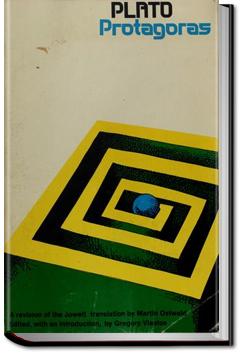UNLIMITED Audiobooks and eBooks
Over 40,000 books & works on all major devices
Get ALL YOU CAN for FREE for 30 days!
Protagoras
Plato
Book Overview:
Jowett, in his always informative introduction, sees this dialogue as transitional between the early and middle dialogues. Socrates meets with Protagoras and other sophists and pursues his inquiry into virtue. The dialectic brings the thinkers to a surprising ending. Socrates narrates this dialogue.
Jowett, in his always informative introduction, sees this dialogue as transitional between the early and middle dialogues. Socrates meets with Protagoras and other sophists and pursues his inquiry into virtue. The dialectic brings the thinkers to a surprising ending. Socrates narrates this dialogue.
How does All You Can Books work?
All You Can Books gives you UNLIMITED access to over 40,000 Audiobooks, eBooks, and Foreign Language courses. Download as many audiobooks, ebooks, language audio courses, and language e-workbooks as you want during the FREE trial and it's all yours to keep even if you cancel during the FREE trial. The service works on any major device including computers, smartphones, music players, e-readers, and tablets. You can try the service for FREE for 30 days then it's just $19.99 per month after that. So for the price everyone else charges for just 1 book, we offer you UNLIMITED audio books, e-books and language courses to download and enjoy as you please. No restrictions.
PROTAGORAS
PERSONS OF THE DIALOGUE: Socrates, who is the narrator of the Dialogue to his Companion. Hippocrates, Alcibiades and Critias. Protagoras, Hippias and Prodicus (Sophists). Callias, a wealthy Athenian.
SCENE: The House of Callias.
COMPANION: Where do you come from, Socrates? And yet I need hardly ask the question, for I know that you have been in c. . . Read More
Try now for FREE!

"Love your service - thanks so much for what you do!"
- Customer Cathryn Mazer
"I did not realize that you would have so many audio books I would enjoy"
- Customer Sharon Morrison
"For all my fellow Audio Book & E-Book regulars:
This is about as close to nirvana as I have found!"
- Twitter post from @bobbyekat



Community Reviews
Celebrity Death Match Special: Plato versus Isaac Asimov
[A street in Athens. Late evening. SOCRATES and R. DANEEL OLIVAW]
OLIVAW: Greetings.
SOCRATES: Are you a demon? A messenger of the Gods? A--
OLIVAW: I am a robot from the future. There are some things I need to understand better. People say you ma
“It makes no difference to me, provided you give the answers, whether it is your own opinion or not. I am primarily interested in testing the argument, although it may happen both that the questioner, myself, and my respondent wind up being tested.”
***
“Well, then, do you say that ignorance is to
This is maybe the only dialogue I've read which was actually a dialogue. So often, a Platonic dialogue consists of little more than Socrates asking a series of questions, some of them lasting for a page or more, and then his interlocutor giving a one to three word answer. Here, Protagoras stands up
Sokrates ile Protagoras kalabalık bir izleyici topluluğunun önünde erdemin öğretilebilir olup olmadığını tartıştığı "Protagoras", bir yandan cesaret kavramının içine açmaya çalışırken diğer yandan haz kavramanın rolünün ne kadar önemli olduğununun da altını çiziyor. Diğer eserlerin aksine daha diyal
"Mnogo je veća opasnost kupovati znanje nego hranu." Ovo je dijalog o obrazovanju, i po temi meni jedan od najdražih. Ipak... Najpre moram sa žaljenjem da zaključim da su 2500 godina kasnije, pobedili sofisti a da je Sokrat izgubio. I drugo, sam tekst Protagore mi nije legao koliko neka druga Platon
امروز بر آن شدی که روح خود را به سوفیستی بسپاری تا آن را بپروراند. میدانی سوفیست کیست؟ اگر پاسخ این سوال را ندانی معلوم خواهد شد نمیدانی روح خود را به چگونه کسی می سپاری و روح تو را بدتر خواهد ساخت یا بهتر.
.پروتاگوراس محاوره ای درباره تربیت است. در آغاز هیپوکراتس را می بینیم که با شوق زیادی نزد سقرا
But you cannot buy the wares of knowledge and carry them away in another vessel; when you have paid for them you must receive them into the soul and go your way, either greatly harmed or greatly benefited
In style the Protagoras is intermediate between the questioning Socrates of the early dialog